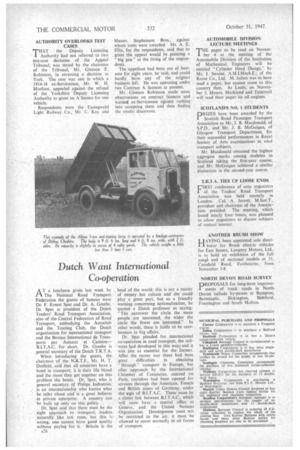Dutch Want International Co-operation
Page 28

If you've noticed an error in this article please click here to report it so we can fix it.
AT a luncheon given last week by The National Road Transport Federation the guests of honour were Dr. F. Ernest Spat and Dr. A. Greebe. Dr. Spat is president of the Dutch Traders' Road Transport Association, also of the Central Federation of Road Transport, embodying the Autoclub and the Touring Club, the Dutch• organization for international transport and the Bureau International de Transports par Autocar et CamionB.I.T.A.C. for short. Dr. Greebe is general secretary of the Dutch T.R.T.A.
When introducing the guests, the chairman of the N.R.T.F., Mr. H. T. Duffield, said that all countries have a bond in transport; it is their life blood and the more they got together on this problem the better. Dr. Spat, who is general secretary of Philips Industries.
• is an internationalist who knows what he talks about and is a great believer in private enterprise. A country can be built up only on this policy.
• Dr. Spat said that there must be the right approach to transport; traders naturally like low rates, but this is, wrong, one cannot have good quality without paying fur it. Britain is the
A26
head of the world: this is not a matter of money but culture and she could play a great part, but as a friendly warning concerning nationalization, he quoted a Dutch professor as saying: "The narrower the circle the more people are interested, the wider the circle the fewer are interested." In other words, there is liable to be carelessness in big affairs.
Dr. Spat pleaded for international co-operation in road transport, the railways had developed in this way; and it was just as essential for the former. After the recent war there had been
great difficulties in obtaining "through' transport in Europe, but after approach by the International Chamber of Commerce, centred on Paris, corridors had been opened for services through the American. French and British zones of Germany, under thewgis of B.1.T.A.C. There must be a closer link between B.1.T.A.C., which will soon have a central office at Geneva, and the United Nations Organization. Development must not be restricted to the air; it must be allowed to occur normally in all forms of transport.












































































